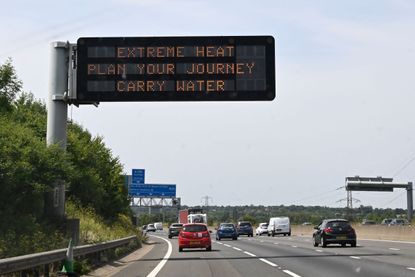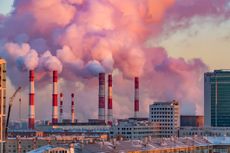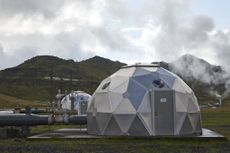Savor the summer, experts say. You will see these temps again.
Extremely hot summers are here to stay


A free daily digest of the biggest news stories of the day - and the best features from our website
Thank you for signing up to TheWeek. You will receive a verification email shortly.
There was a problem. Please refresh the page and try again.
This summer has already been marked by record-high temperatures, with July 3 through July 6 being historically the hottest four days on record. However, this is just the beginning, according to experts, and temperatures will only get warmer from here.
Why is this summer so hot?
There have been heatwaves all over the world this summer, with the warmest day on record reaching an average global temperature of 63.02 degrees Fahrenheit, almost two degrees warmer than the previous record, Axios wrote. This unprecedented level of heat can be attributed to three factors: heat domes, El Niño, and climate change.
Heat domes occur "when a ridge of high pressure builds over an area and doesn't move for up to a week or more," according to CNN. The ridge traps heat in warming regions to high temperatures for extended periods of time. Many heat records have been set because of a heat dome, and they are expected to become more frequent due to climate change.
Subscribe to The Week
Escape your echo chamber. Get the facts behind the news, plus analysis from multiple perspectives.

Sign up for The Week's Free Newsletters
From our morning news briefing to a weekly Good News Newsletter, get the best of The Week delivered directly to your inbox.
From our morning news briefing to a weekly Good News Newsletter, get the best of The Week delivered directly to your inbox.
Every warming event is also being magnified due to El Niño, a weather phenomenon where "sea temperatures at the surface in the central and eastern tropical Pacific Ocean become substantially warmer than normal," according to the World Meteorological Organization. One of the effects of the phenomenon is adding additional warming because the ocean's heat also warms the atmosphere.
The largest contributor to the temperature spike is climate change. "Human-driven climate change adds a permanent super El Niño worth of heat to the atmosphere every decade," climate scientist Zeke Hausfather told The Associated Press. The continual burning of fossil fuels releases greenhouse gases into the atmosphere, which trap heat. Compounded with the other factors, the conditions are perfect for extreme heat.
What is the forecast for future summers?
"Hotter extremes are one of the most obvious consequences of rising global temperatures," John Nielsen-Gammon, a climatologist at Texas A&M University, told Vox. These extremes are only going to worsen as climate change intensifies, with CNN calling summers "survival tests." According to the U.S. Environmental Protection Agency, the frequency of heat waves has increased over the years from an average of two per year in the 1960s to an average of six in the 2020s.
"Until we stop burning fossil fuels, this will only get worse," remarked climate scientist Friederike Otto to AP. "Heat records will keep getting broken, people and ecosystems are already in many cases beyond what they are able to deal with." Human impact will continue to exacerbate the extreme weather all over the world — the record temperatures this summer were "made twice as likely because of man-made climate change," per BBC.
"Earth is screaming at us right now and people need to listen," chief meteorologist and director of Climate Matters, Bernadette Woods Placky told CNN. "It should be a wake-up call or an urgency to people that this is just not normal." In addition, the warmer the temperatures get, the more people will crank up their air conditioners, which in turn worsens climate change.
"The broad effect of climate change is pretty clear," wrote Vox. "It will make heat waves more common, longer-lasting, and more extreme."

Continue reading for free
We hope you're enjoying The Week's refreshingly open-minded journalism.
Subscribed to The Week? Register your account with the same email as your subscription.
Sign up to our 10 Things You Need to Know Today newsletter
A free daily digest of the biggest news stories of the day - and the best features from our website
Devika Rao is a staff writer for The Week. She graduated from Cornell University with a degree in Environment and Sustainability and a minor in Climate Change. Previously, she worked as a Policy and Advocacy associate in the nonprofit space advocating for environmental action from the business perspective. She is passionate about the environment, books, and music.
-
 'Calling women "ladies" belongs in the dark ages'
'Calling women "ladies" belongs in the dark ages'Instant Opinion Opinion, comment and editorials of the day
By The Week Staff Published
-
 Mercy killings: what new CPS guidance means for assisted dying law
Mercy killings: what new CPS guidance means for assisted dying lawThe Explainer Prosecutors detail circumstances when it is appropriate not to bring charges
By Chas Newkey-Burden, The Week UK Published
-
 The daily business briefing: October 6, 2023
The daily business briefing: October 6, 2023Business Briefing Exxon Mobil is close to deal to buy shale-driller Pioneer, the SEC sues Musk for testimony on Twitter stock purchase, and more
By Harold Maass Published
-
 Why frogs and other amphibious 'climate captives' are 'the world's most threatened animals'
Why frogs and other amphibious 'climate captives' are 'the world's most threatened animals'Speed Read Endangered mammals and birds get a lot of attention, but amphibians are faring much worse in this hotter world
By Peter Weber Published
-
 Why New York City was caught off guard by flash flooding
Why New York City was caught off guard by flash floodingTalking Point Is climate change moving too fast or are city leaders dragging their feet?
By Theara Coleman Published
-
 6 of the most invasive species on the planet
6 of the most invasive species on the planetSpeed Read Invasive species are a danger to ecosystems all over the world
By Devika Rao Published
-
 Air pollution is now the 'greatest external threat' to life expectancy
Air pollution is now the 'greatest external threat' to life expectancySpeed Read Climate change is worsening air quality globally, and there could be deadly consequences
By Devika Rao Published
-
 How climate change is impacting the water cycle
How climate change is impacting the water cycleSpeed Read Rain will likely continue to be unpredictable
By Devika Rao Published
-
 What is carbon capture?
What is carbon capture?feature The U.S. is investing in technologies that keep CO2 out of industrial emissions — or that remove it from the atmosphere
By The Week Staff Published
-
 Why spotted lanternflies are back and worse than ever
Why spotted lanternflies are back and worse than everSpeed Read It's time to get squashing!
By Devika Rao Published
-
 Why the hunt for Nessie is back and bigger than ever
Why the hunt for Nessie is back and bigger than everTalking Point The elusive creature still brings thousands to the Scottish Highlands
By Devika Rao Published










